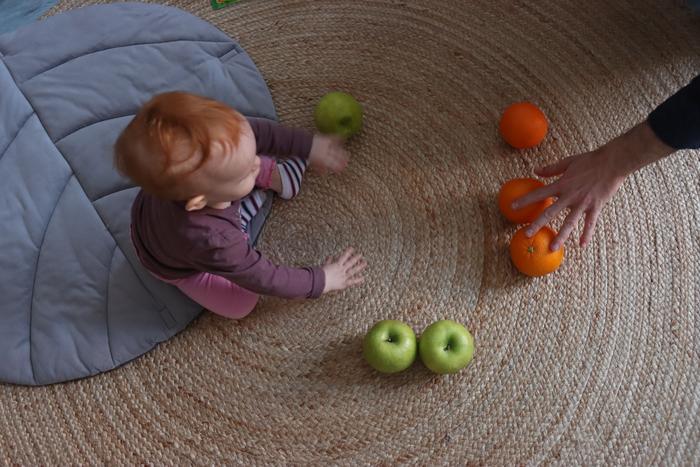Infants less than a year old can combine simple concepts into complex ideas, showing that creativity begins in babyhood.

Credit: Photo: Peter Lengyel-Szabo
Infants less than a year old can combine simple concepts into complex ideas, showing that creativity begins in babyhood.
According to new research at the University of Birmingham, in the UK, and Central European University, in Austria and Hungary, babies are not only capable of creative thinking well before starting to speak, but this sort of thinking may be essential for language acquisition.
In the study, published in PNAS, the researchers set out to explore the origins of human creativity and productive thinking to try to find out how people arrive at completely new thoughts and ideas. The basic mechanism for doing this is taking familiar concepts and combining them into new structures, but little is known about how early in life these abilities can be used.
The researchers found that babies were able to very quickly learn new words that describe small quantities – an impressive achievement – and combine these spontaneously with familiar words to fully understand a phrase.
Lead researcher, Dr Barbara Pomiechowska, carried out the research while a postdoctoral fellow at the Central European University (CEU). She is now an assistant professor in the School of Psychology, at the University of Birmingham, in the UK.
Dr Pomiechowska said: “Human creativity has no boundaries: it has taken us to the moon and allowed us to cure deadly diseases – but despite its importance, we don’t yet know when and how this impressive ability to combine ideas and invent new things emerges. This research shows that we must go right back to the beginning of language acquisition to solve this puzzle.”
In the study, the researchers worked with a cohort of 60 babies, all around the age of 12 months. They started by teaching the babies two novel words describing quantity: ‘mize’, to mean ‘one’, and ‘padu’, to mean ‘two’.
Then the babies were asked to combine these new number words with different object names, for example to identify ‘padu ducks’ from among a choice of images. By teaching novel words to represent quantities, the researchers were able to test the babies’ ability to combine concepts in real time, rather than simply recall combinations of words that they already knew from previous experience.
By using eye-tracking technology to monitor where the babies look, the researchers were able to show that the infants could successfully combine the two concepts to understand what they were being asked about.
Dr Agnes Kovacs, from CEU’s Department of Cognitive Science and CEU’s Cognitive Development Center, added: “For babies, this ability to combine different concepts is likely to help not only to interpret the complex language input, but also to learn about different aspects of the physical and social world. For adults, it’s an ability that helps to move past everything that’s already been thought of, opening the mind towards endless possibilities.”
ENDS
For media enquiries, interviews or a copy of the research paper, contact Press Office, University of Birmingham, tel: +44 (0)121 414 2772 or [email protected]
PHOTO CAPTIONS – please credit as indicated:
-
Photo 1: A baby learning words and numbers through play with their caregiver. Photo: Peter Lengyel-Szabo
-
Photo 2: First steps into the world of numerosity: a baby thoughtfully observing sets of different objects. Photo: Peter Lengyel-Szabo
-
Photo 3: A toddler discovering a wealth of combinatorial properties of the world. Photo: Erno Teglas
-
Photo 4: First steps into the world of numerosity: a baby thoughtfully observing sets of different objects. Photo: Peter Lengyel-Szabo
Notes to editor:
-
The University of Birmingham is ranked amongst the world’s top 100 institutions. Its work brings people from across the world to Birmingham, including researchers, teachers and more than 8,000 international students from over 150 countries.
-
Central European University (CEU) is accredited in the United States and Austria and offers English-language bachelor’s, master’s and doctoral programs. CEU enrols around 1400 students from more than 100 countries and has a faculty from more than 50 countries.
-
Early-emerging combinatorial thought: human infants flexibly combine kind and quantity concepts – Barbara Pomiechowska, Gábor Bródy, Ernő Téglás, Ágnes M. Kovács is published by PNAS.
-
Participating institutions: University of Birmingham, UK; Brown University, USA; and Central European University, Vienna, Austria.
Journal
Proceedings of the National Academy of Sciences
DOI
10.1073/pnas.2315149121
Method of Research
Experimental study
Subject of Research
People
Article Title
Early-emerging combinatorial thought: human infants flexibly combine kind and quantity concepts
Article Publication Date
10-Jul-2024



